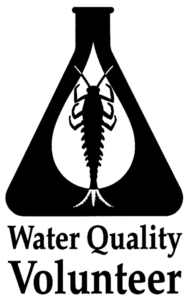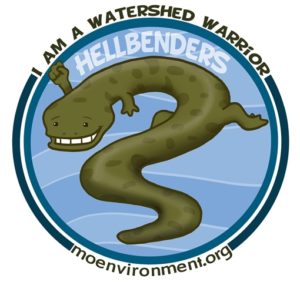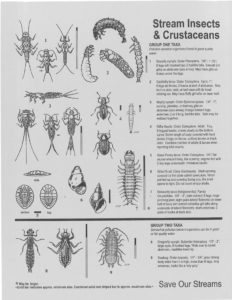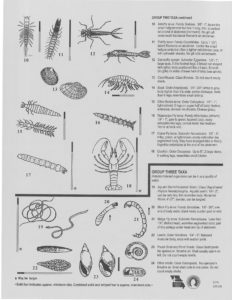by Maggie Hennessey, MCE Clean Water Outreach and Advocacy Intern
On Friday, March 18th, MCE Clean Water Policy Coordinator, Alicia Claire Lloyd and I attended the Missouri Stream Team Introductory Volunteer Water Quality Monitoring Workshop. On this chilly spring day, we had the opportunity to learn about stream monitoring in a classroom setting before putting it to use in the field. Along with 25 other eager volunteers, we put on our waders and explored a nearby creek, recording stream discharge and macroinvertebrate data.
What are macroinvertebrates..? Bugs. Water bugs in this instance. And stream discharge is the rate of flow in a waterway – essentially how fast the water is moving. The ecosystem make up of observable plants, bugs, and fish are reflective of the overall health of the waterway. The Introductory Stream Team Water Quality Monitoring training teaches citizen volunteers how to evaluate these indicators using established, scientifically-sound protocols on streams and waterbodies in their watersheds.

The Stream Team Program started as a collaboration between the Missouri Department of Conservation, the Department of Natural Resources and the Conservation Federation of Missouri. The primary goals of the program are to improve education about stream systems, promote stewardship through hands-on volunteer projects, and advocate for stream health. Ultimately, the Stream Team Program provides opportunities for citizens to get involved and work towards clean streams and a healthy planet.

The Volunteer Water Quality Monitoring (VWQM) portion of this program aims to educate citizens and provide necessary skills and training for volunteers to collect biological, chemical and physical stream monitoring data. This data is then used by municipalities and organizations to assess stream health and inform watershed management strategies.
Along with the introductory training, there are three additional levels of VWQM training that each provide a greater knowledge and familiarity with the techniques used to monitor water quality. Since MCE is not able to monitor water quality across the state, we appreciate the efforts of Stream Team volunteers in gathering data so that we can communicate water quality issues to the public and advocate for change. In order for us to more fully understand the process of stream monitoring and the markers of water quality, we decided to become Volunteer Water Quality Monitors and see what it’s all about.
At the Introductory VWQM Workshop, topics relating to watersheds were emphasized, from watershed mapping to stressors and sources of pollution. Water chemistry and macroinvertebrate data can be used to identify possible sources of organic waste and urban runoff, and volunteers are critical for recording changes in these parameters that may indicate a potential problem. At the workshop we learned how to collect and identify various macroinvertebrate species; these species can be good indicators of water quality due to varying pollution tolerances.
Aquatic macroinvertebrates can be represented by three categories of pollution tolerance: pollution sensitive, somewhat pollution tolerant, pollution tolerant. Thus, a stream dominated by pollution tolerant species may indicate that some level of degrading pollution is present. It is also important for volunteers to make note of physical characteristics like stream flow and both the type and amount of vegetation present. All of this data provides information about how human and ecosystem activities affect the quality of our streams over time.
Example organisms in pollutant tolerant, somewhat pollutant tolerant, and pollution sensitive groups:
For more information on Stream Team activities, or to sign up for a water quality monitoring training workshop, head to www.mostreamteam.org
Not ready to volunteer yet but still want to help take action for clean water? Visit moenvironment.org/watershedwarrior and take the pledge to become a Watershed Warrior!



